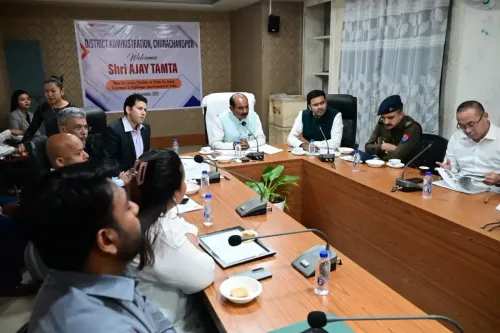The Third Eye: Tenets Guiding Professional Intelligence Agencies

Synopsis
Key Takeaways
- Intelligence is essential for proactive security measures.
- Reliable information must be prioritized for effective action.
- Agencies must adapt to evolving security challenges.
- Collaboration and information sharing enhance intelligence effectiveness.
- Modern technologies like AI support intelligence functions.
New Delhi: Security fundamentally refers to protection against the 'covert' offensives of adversaries. While open military assaults are managed by defense forces, these can only be effectively countered if insights into the enemy's clandestine operations, termed as Intelligence, are made available beforehand.
Intelligence serves as the 'foundation' of Security, which explains why nations invest in well-trained Intelligence agencies tasked with generating such crucial information.
In the relationship between Security and Intelligence, the dynamic is characterized by 'information' versus 'action.' Both elements must operate in the national interest, achievable only when agencies adhere to a defined set of guidelines while executing their responsibilities. The information they provide must facilitate an 'integral' response.
Initially, an agency must assess, using its 'own judgement,' what constitutes a threat to national integrity and begin tracking its origin and possible developments.
This does not negate the legitimate 'tasking' assigned by the current government.
In today's complex geopolitical environment, threats may arise from a mix of entities and situations that need to be uncovered to secure comprehensive Intelligence, which remains the objective of these agencies.
There are fundamental principles that cannot be compromised.
An Intelligence organization refrains from disseminating information unless its reliability is completely assured.
They possess an exceptional understanding of the 'actionability' of the Intelligence they provide; consequently, an authority taking action may face severe consequences if it prematurely concludes that the Intelligence lacks specificity for actionable steps.
Each Intelligence 'alert' opens the door for preventive measures against a threat, even if the warning does not specify the exact time and location of a clandestine 'enemy strike.'
An Intelligence agency should not withhold actionable insights while pursuing 'completeness.'
They are professionally committed to ensuring that information regarding security threats is communicated swiftly and have a vested interest in monitoring how action-taking authorities respond.
Secondly, Intelligence organizations understand that Security is not a 'one-time event' but must adapt to evolving circumstances.
The agency also consistently strives to enhance its operations based on experience.
Its primary responsibility includes delivering timely threat information to all action-takers without delay, ensuring it reaches them.
Inaction from responders can lead to security breaches; however, a security failure due to a lack of communication of Intelligence would signify a grave systemic flaw.
The Kargil Committee Report highlighted that numerous pieces of Intelligence failed to progress beyond Brigade headquarters, likely due to neglecting the essential principle that all Intelligence must reach the 'apex' point for determining the 'integral response.'
If this does not occur, it deprives the final authority of the opportunity to assess the 'total' available information when responding.
This aligns with the fundamental principle of the Age of Information, which states that 'knowledge-based decision-making' is essential for success; the more comprehensive the knowledge, the better the action taken.
Intelligence is a valuable resource, and none of it should be allowed to be 'lost in transit.'
In India, national Intelligence agencies primarily handle 'information' without exercising police powers, making it even more crucial for them to ensure timely communication of relevant Intelligence to action-takers.
The third guiding principle for Intelligence relates to national security's multi-dimensional challenges, which now encompass not only traditional threats like espionage and sabotage but also non-traditional dangers such as food and water scarcity, economic security, and climate change.
The Information Technology revolution of 1991 changed the landscape of global security by facilitating instantaneous communication across borders, transforming social media into a combat tool, and presenting the universal risk of cyber attacks that could devastate critical infrastructure and strategic assets.
In the era of 'proxy wars' that emerged post-Cold War, 'influencing' governance systems and destabilizing regimes through 'narrative building' have become prevalent forms of 'covert' offensive.
Additionally, Economic Intelligence has gained unprecedented significance, as the doctrine that 'national security is inseparable from economic security' has become widely accepted.
Undermining an opponent's economic strength, particularly targeting economically strategic assets, has become a fundamental aspect of modern 'warfare,' necessitating the protection of such establishments as a basic security requirement.
Furthermore, as a combination of human and technical Intelligence becomes imperative for national security, India established the National Technical Research Organisation (NTRO) in 2004 as a technical intelligence agency promoting technological innovation to enhance intelligence production.
NTRO reports to the National Security Advisor and specializes in areas such as remote sensing, SIGINT, data processing, cybersecurity, cryptology, hardware and software development, and strategic monitoring.
Artificial Intelligence (AI), the pinnacle of Information Technology, is enhancing analytical functions by enabling rapid examination of extensive public domain data across various parameters, aiding in predicting enemy behavior by illuminating the adversary's modus operandi.
AI applications are emerging across the domains of Intelligence and Security.
The fourth essential working principle of security is that national intelligence agencies must collaborate effectively, ensuring that intelligence-sharing arrangements with international allies are established to address common geopolitical security issues.
Particularly in the Indian context, it is reasonable to anticipate that Intelligence agencies will have opportunities to exchange information with the National Intelligence Agency (NIA) investigating terrorism-related cases or with an Economic Intelligence Unit (EIU) examining the funding of illicit organizations.
These organizations, in turn, could uncover information that supports national Intelligence agencies in their endeavors.
Moreover, modern diplomacy encourages sharing information on mutual security challenges like terrorism, drug trafficking, and human trafficking among allied nations; foreign policy is inherently influenced by national security and economic considerations.
The Multi Agency Centre (MAC) operated by the Intelligence Bureau has proven invaluable in consolidating intelligence from participating organizations concerning specific threats or issue areas.
Civil-Military intelligence cooperation has also seen continuous improvement, particularly in regions where the Army is engaged in counter-insurgency and counter-terrorism operations.
Intelligence-driven operations by the Army and Paramilitary Forces have recently demonstrated significant success.
Lastly, the effectiveness of an intelligence organization heavily relies on its internal management, recruitment strategies, and training protocols.
India has consistently embraced a robust approach by inducting top-tier officers from the Indian Police Service (IPS) annually to lead the Intelligence Bureau, thereby ensuring a built-in advantage through a close relationship with state police.
This remains a fundamental requirement for safeguarding internal security.
Selected officers are recognized for their willingness to embrace anonymity, their capacity for hard work, and their analytical mindset.
The agencies also recruit directly in sufficient numbers.
All entrants, regardless of rank, must complete a comprehensive 'basic course' on intelligence tradecraft before undergoing probation for final acceptance.
There is a healthy exchange of personnel between internal and external intelligence agencies, as well as provisions for lateral induction of area and subject specialists.
This has proven effective, particularly under the current National Security Advisor, who possesses an intelligence background, and should be maintained.
It is noteworthy that the Intelligence Bureau's operations are characterized by internal transparency within the framework of 'need to know,' a clear understanding of credit-sharing, and a tradition of 'nurtural' leadership.
This fosters professional development and ensures that operators retain the initiative to pursue tasks with full dedication.
Senior officers within the Intelligence organization willingly work long hours without prompting and are always available to guide their subordinates when assistance is requested.
Established by the British in 1888, the Intelligence Bureau celebrated its centenary in 1988, reaffirming its goal of providing the current regime with information regarding security-relevant developments both domestically and internationally, without engaging in political maneuvers.
Since independence, India's Intelligence agencies have maintained the unwavering trust of the national government, regardless of its political nature, and this is perhaps the strongest testament to their leadership operating without vested interests.
(The author is a former Director of the Intelligence Bureau. The views expressed are personal.)









